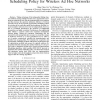52 search results - page 10 / 11 » Interference Subtraction with Supplementary Cooperation in W... |
GLOBECOM
2007
IEEE
13 years 11 months ago
2007
IEEE
— 1 Taking advantage of the independent fading channel conditions among multiple wireless users, opportunistic transmissions schedule the user with the instantaneously best condi...
PIMRC
2010
IEEE
13 years 3 months ago
2010
IEEE
In this paper, a new type of collaboration in wireless sensor networks (WSN) is suggested that exploits array processing algorithms for better reception of a signal. For receive co...
CCR
2004
13 years 5 months ago
2004
A wireless ad hoc network is formed by a group of wireless hosts, without the use of any infrastructure. To enable communication, hosts cooperate among themselves to forward packet...
JUCS
2008
13 years 5 months ago
2008
: Multi-Agent Systems (MAS) constitute a well known approach in modelling dynamical real world systems. Recently, this technology has been applied to Wireless Communication Systems...
TCOM
2008
13 years 5 months ago
2008
Driven by applications in data-hiding, MIMO broadcast channel coding, precoding for interference cancellation, and transmitter cooperation in wireless networks, Costa coding has la...

